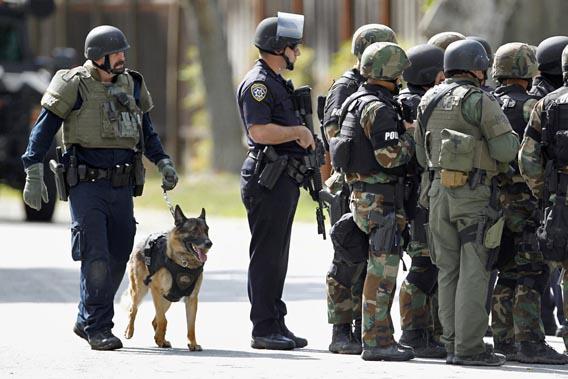Last fall, I asked you for your dog sniffing stories. I was writing about two Supreme Court cases: In the first, Florida v. Jardines, the Miami police used a dog named Franky to check for drugs at the home of Joelis Jardines. Led onto the porch by his police handler, Franky sat down by the front door, alerting his handler that he smelled something of interest. The police then found marijuana growing inside. In the second case, Florida v. Harris, a sheriff’s deputy pulled over Clayton Harris—the truck he was driving had an expired license plate—and because he was shaking and breathing fast, so the deputy asked for permission to search his truck. When Harris said no, the deputy brought over Aldo, who alerted him to a smell on a door handle. The deputy looked inside the truck and found ingredients for making methamphetamine.
Both Jardines and Harris challenged the searches as violations of their Fourth Amendment rights, arguing that the police should have gotten a warrant before they deployed Franky and Aldo. Harris lost last month. On Tuesday, Jardines won. The difference mostly comes down to the Constitution’s deference to the home as a place we retreat to with special expectations of privacy. A man’s home (not his car) is his castle. Whether or not dog is his best friend.
Justice Antonin Scalia announced Jardines’ victory today for a 5-4 court. He had all the liberal-moderates on his side except for Justice Stephen Breyer, who joined the conservatives in dissent. Scalia called this an “easy” case. He said the problem was that the cop who wanted to search Jardines’ house had “all four of his feet, and his companion’s feet, firmly planted” on Jardines’ porch. The Fourth Amendment’s special protection against police intrustion into the home, Scalia said, extends to the porch. (In legalese, it counts as “curtilage,” or the area immediately surrounding a house.) Since the police had no search warrant to be on Jardines’ porch, there was no valid search.
In the case decided last month, by contrast, the court unanimously made it pretty easy for Aldo to search Harris’ truck, once the dog alerted to the smell of drug ingredients on the door handle. To Scalia, and the justices who voted with him, Franky’s presence on the porch was another matter. Scalia took a similar position in a 2001 case about whether the police could use thermal imaging to monitor heat coming from inside a home—heat that could signify the lamps used to grow marijuana. Dogs trained to sniff for drugs aren’t new fangled science, like thermal imaging. But as Justice Elena Kagan put it in a concurring opinion, they’re like high-powered binoculars used to peer in the window—not the kind of “reasonable” search you think the police will conduct without a warrant or your consent.
In your tales of dog sniffing, you didn’t talk about being searched at home. But your examples of dogs who mistook smelly cheese or unwashed clothes for drugs—along with research that calls into question dogs’ reliability—are reason to welcome Tuesday’s ruling. At least police dogs have to keep their sniffing away from our front doors.
